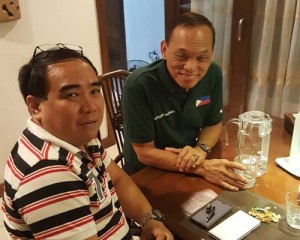AT least one provincial governor and some members of the House of Representatives are among government officials linked to illegal drug trade, according to former Philippine Drug Enforcement Agency (PDEA) director general Dionisio Santiago.
In an exclusive interview at his residence in Taguig City (Metro Manila), Santiago also disclosed that he had sent a full report on the involvement of the public figures to Defense Secretary Voltaire Gazmin as early as 2010, before he left PDEA.
“I surmise Malacanang already has a copy of my report. It contained everything, including the who’s who in the drug industry. The highest government officials included in my report were a governor and some active lawmakers from Southern Tagalog and Central Luzon,” he told The Manila Times.
He said he brought his report to Gazmin as he was about to be replaced at PDEA.
Both Gazmin and Santiago are former military generals, but the latter became chief of staff of the Armed Forces of the Philippines.
The former PDEA chief mentioned the names of the governor and the lawmakers whom the PDEA believed were involved in illegal drugs.
He, however, asked that the names be not printed in this report.
“So if they want to know all about the extent of the illegal drug menace in the country, they should ask Secretary Gazmin, PDEA or even Malacanang,” Santiago said.
When asked if he could support claims that there is active “narco-politics” in the country, the former military general replied, “Certainly.”
“It’s where they get their funds. The problem is this, even if you have an A1 [highest] information about the involvement of certain government officials, it would be very hard to prove it and it is most likely that the case will not even stand in court. This makes [prosecuting them] hard really very hard,” Santiago explained.
In fact, he said, he knew of a top PDEA official, with the rank of regional director, who had been receiving P1 million from a known drug lord in his area.
“Sad thing is, according to my former people who remain in the agency, drug money crawled up even higher in the PDEA hierarchy,” Santiago added.
He said the regional director used to be “very close” to him but he lost trust in the official when he learned of his illicit activities.
“That (expletive) is even a relative of someone who holds a top position in the office of one senator,” Santiago pointed out.
He named the regional director and the senator but again requested not to publish their names.
Santiago, however, said the senator was not in any way involved in illegal drugs.
For purposes of this exclusive story, The Manila Times had sent a quationnaire to Glenn Malapad, Officer-in-Charge, Public Information Offic, PDEA, for comment and any input.
A staff member said she would provide data and probably their reaction to the article, but the Times has yet to receive such as of press time.
Sen. Grace Poe, chairman of the committees on public information and on illegal drugs, said nobody can deny the fact that “government officials themselves are involved in the illegal drug trade.”
“But definitely, from year on end, we need to be able to expose the names of those people. And I would probably do so,” Poe said in a statement released by her office to The Manila Times.
According to the lawmaker, she believes that the threats of narco-politics are present and active in the country.
“If there’s a rise in the incidence of violence and the sale of drugs during this time, we cannot help but associate that perhaps to campaign funds. Remember that the government has tightened [its] grip on [election] expenditures,” Poe explained.
She noted that the drug problem grew even worse after the Supreme Court stopped the Priority Development Assistance Fund (PDAF).
Since the PDAF is already dead, it caused limitations on discretionary spending by government officials.
“So they obviously had to resort to some other means to fund their campaign… if local government or public officials are involved, this could be the root if they are involved,” she added.
Poe said she plans to get all the names of “popular” drug lords who have not yet been apprehended and vowed to “make them public.”
To show the involvement of drug lords with politicians, she cited a hearing last week at the Senate where she named a barangay (village) councilor in Iloilo as being “directly involved” with alleged drug kingpin Melvin Odicta Sr.
A city councilor had presented Poe, albeit in confidence, a “bluebook” prepared by a local policeman who went undercover before he was assassinated in January.
The “bluebook,” she said, contains all the names of local government, police and PDEA officials who are in the pockets of Odicta.
Former PDEA chief Santiago said he knows Odicta as “big time” and that he was even planning to “expand his empire.”
“He wanted to operate in other regions. I heard that drug operators in other areas are threatened by him, so that they would not allow him to be there. But Odicta has bigger dreams,” he added.
The name Odicta drew so much public attention after he and his men, numbering around 20, were reported to have attempted to break into the Aksyon Radyo station in Iloilo City in late 2015.
Poe has since conducted a probe in the southern city, where many believe that local politicians in city hall have in one way or another been involved in illegal drugs.
She said politicians may not be directly connected as users or are peddlers but their involvement may come in the form of receiving bribes and regular payola or campaign contributions.


